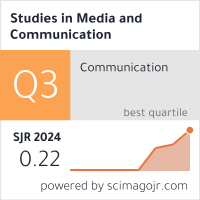Mandating Self-Imposed Curfew - An Analysis of PM Modi's Janta Curfew Speech
Abstract
This study explores the persuasive strategies used by the Indian Prime Minister (PM) Narendra Modi to appeal to the citizens of India, to observe ‘Janta Curfew’ or People’s Curfew, as a preventive measure to contain the spread of Covid-19 infections in India. The study maps the speech to established strategies and theories of persuasion such as Aristotle’s Rhetorical Triangle, Elaboration Likelihood Model, Monroe's Motivated Sequence, and Cognitive Dissonance Theory; and ascertains the indispensability of the aforementioned theoretical frameworks. The study also identifies Modi’s unique persuasive strategies such as wheedling, building-up (before delivering), complimenting before criticizing, Eutrepismus, and subtly titling the task; and analyzes their effectiveness in persuading the citizens of India to comply with Janta Curfew.
Full Text:
PDFDOI: https://doi.org/10.11114/smc.v10i2.5661
Refbacks
- There are currently no refbacks.
Studies in Media and Communication ISSN 2325-8071 (Print) ISSN 2325-808X (Online)
Copyright © Redfame Publishing Inc.
To make sure that you can receive messages from us, please add the 'redfame.com' domain to your e-mail 'safe list'. If you do not receive e-mail in your 'inbox', check your 'bulk mail' or 'junk mail' folders.
If you have any questions, please contact: smc@redfame.com
------------------------------------------------------------------------------------------------------------------------------------------------------

